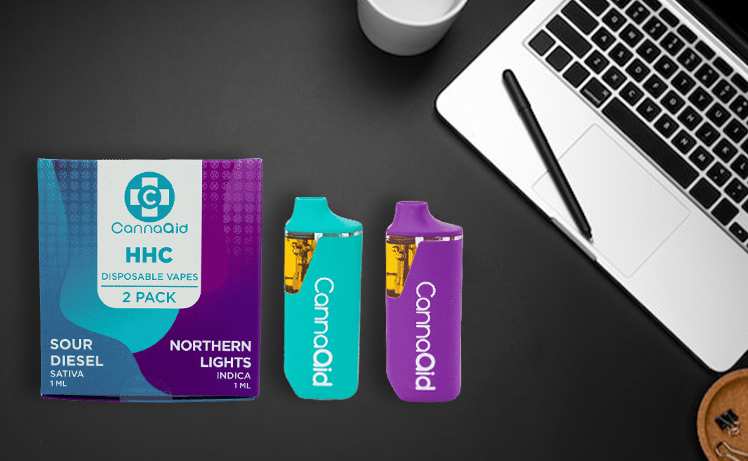What is HHC? How Does It Work & Is It Safe?

HHC is a new product you may have seen in your local vape shop. It is a hemp-derived cannabis cannabinoid that is making waves.
HHC is unique because it can deliver close to a THC high, just like Delta-8 THC. Although this prize is highly sought-after, there are many questions about HHC.
Here’s everything you need to know about HHC.
What is HHC?
It’s true that there are always new cannabinoids. HHC is a popular new cannabinoid in the world. But what exactly is HHC?
HHC stands for hexahydrocannabinol. It is essentially a cannabinoid that has an additional hydrogen molecule attached. It can easily be synthesized in a laboratory despite its very small abundance.
HHC can have effects similar to mild THC highs. Although it can increase energy and creativity, the effects of HHC are usually much less than THC. The side effects are similar to those you’d experience with THC.
Do HHC Disposables Get You High?
Premium-quality HHC disposable vape pens produce most of the effects of normal vapes. To help you truly experience the smooth and mellow effects of smoking, CannaAid disposables contain premium HHC.
How is HHC produced?
Let’s get to the chemistry, we promise it is fun and hemp-based!
HHC is produced by attaching a hydrogen atom to THC molecules. Hydrogenation is the process of doing this. Although it may sound complicated, hydrogenation is the same process that transforms vegetable oil into vegetable-based butter.
HHC can also be made with other cannabinoids. HHC is currently most commonly made with CBD, the preferred cannabinoid.
Although the process of turning CBD into HHC can be complicated, it is all down to chemical reactions. The majority of hemp labs use their own processes to create HHC.
HHC is another cannabinoid you cannot make at home. The process requires the use of specialized equipment and potentially hazardous chemicals. To reduce static shock, large-scale HHC production must be conducted in explosion-proof labs that have grounded equipment.
HHC is a thick, oily substance. You can refine it further to make HHC vapes or other products.
Who was the First to Synthesize HHC?
HHC is naturally found in hemp plants, so technically, it isn’t a synthetic cannabinoid. Commercial HHC can be artificially manufactured in laboratories.
Roger Adams, a 1940s chemist, and researcher, created HHC. For a brief time, there was more freedom in research on cannabis compounds in the United States. This research led to many of the hemp derivative products you love today.
How does HHC affect the body?
The effects of HHC are still unknown. HHC, like synthetic or new cannabinoids, must be tested extensively before we can make any definitive conclusions.
The first is HHC’s potency. Two types of HHC molecules are created during the synthesizing process. The first is of high potency and can deliver THC as high. The other has a lower potency and produces much fewer effects.
It’s not possible to distinguish the two during manufacturing. It is, therefore, difficult to predict the strength of your HHC vape.
It feels very similar to Delta-8 THC when HHC hits. Although it’s stronger than a Delta-9 THC strain, the effects are still quite similar to HHC. However, “stronger Delta-8” might be a better way to describe it. HHC may also not have the same psychoactive effects as Delta-9 THC.
HHC’s long-term side effects are unknown. We do know it has the same immediate side effects of Delta-8 THC and Delta-9 THC. In severe cases, you can expect dryness of the mouth, reddened eyes, increased appetite, and anxiety. To get more details about HHC, visit CannaAid.
Is HHC likely to show up in a drug test?
HHC may not be detected in standard drug tests. This doesn’t mean you can use HHC if your employer regularly tests for cannabinoids. Let’s look at the process of cannabinoid drug testing and how HHC may be able to dodge them.
Drug tests are not designed to look for drugs but the chemicals they use in the body’s metabolism. The cannabis drug test doesn’t look for THC but 11-hydroxy-THC, a common metabolite. Some evidence suggests that HHC doesn’t metabolize to 11-hydroxy-THC and can therefore be skipped by most drug tests.
HHC products should be used with caution and good judgment. HHC metabolites are still not well researched. This means that HHC products could contain 11-hydroxy-THC. HHC metabolites will likely be included in future drug tests.
Is it possible to vape HHC?
You can also vape HHC. HHC is a popular vaping option because it has effects similar to Delta-8 THC and Delta-9 THC. HHC can also be found in edibles, oils, and other forms.
Is HHC used in medicine?
HHC is still largely unknown and there aren’t many good studies. We can draw some inferences about the potential medical uses of this new cannabinoid because HHC is very similar with Delta-8 THC.
Many HHC enthusiasts have reported that it improves mood, a major feature of many THC-adjacent products. It could also be used to treat anxiety and mood disorders.
HHC can also increase appetite. HHC may also improve appetite. Medical cannabis has shown remarkable results in improving appetite.
Pain relief with HHC has not been tested. Although CBD, THC, and other cannabinoids are well-respected for their pain relief properties and sleep aids, HHC isn’t yet widely available enough to be tested.
What is the difference between HHC and THC?
It can be challenging to compare HHC and THC. THC, specifically Delta-9 THC, is the granddaddy among all cannabinoids. It is the standard you use when comparing hemp derivatives.
HHC is slightly less potent than THC. HHC can produce many of the same effects as THC but at a lower intensity. It is difficult to know how much HHC you need to have a THC-like experience.
HHC is cerebral, and some people experience a surge in energy. People refer to HHC the same way as they would mild Sativa strains THC products. Although potency for HHC can vary from batch to batch, it is generally considered light to moderate.

